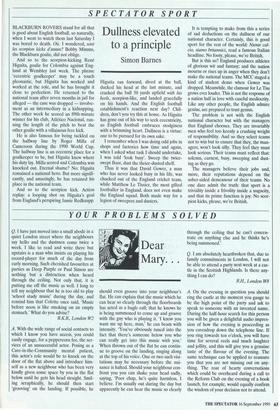SPECTATOR SPORT
Dullness elevated to a principle
Simon Barnes
BLACKBURN ROVERS stand for all that is good about English football, so naturally, when I went to watch them last Saturday I was bored to death. Oa, I wondered, sont les scorpion kicks d'antan? Bobby Mimms, the Blackburn goalie, did not oblige.
And so to the scorpion-kicking Rene Higuita, goalie for Colombia against Eng- land at Wembley last week. The phrase `eccentric goalkeeper' may be a touch pleonastic, but Higuita has worked and worked at the role, and he has brought it close to perfection. He returned to the national team after seven months in jail for alleged — the case was dropped — involve- ment as an intermediary in a kidnapping. The other week he scored an 89th-minute winner for his club, Atletico Nacional, run- ning the length of the pitch to beat the other goalie with a villainous free kick.
He is also famous for being tackled on the halfway line by Roger Milla of Cameroon during the 1990 World Cup. The halfway line is an eccentric place for a goalkeeper to be, but Higuita knew where his duty lay. Milla scored and Colombia was knocked out. Eternal shame? No: Higuita remained a national hero. But more signifi- cantly, and amazingly, he has retained his place in the national team.
And so to the scorpion kick. Action replay: a looping shot on Higuita's goal from England's perspiring Jamie Redknapp. Higuita ran forward, dived at the ball, ducked his head at the last minute, and cracked the ball 50 yards upfield with his heels, scorpion-like, and landed gracefully on his hands. And the English football establishment's reaction next day? Chil- dren, don't you try this at home. As Higuita has gone out of his way to seek eccentricity, so English football embraces stodginess with a brimming heart. Dullness is a virtue: one to be pursued for its own sake.
I remember when I was doing odd jobs in shops and factories how time and again, when I asked what task I should undertake, I was told 'look busy'. Sweep the twice- swept floor, dust the thrice-dusted shelf.
Thus it was that David Gower, a man who has never looked busy in his life, was chucked out of the England cricket team, while Matthew Le Tissier, the most gifted footballer in England, does not even make the England squad. Both made way for a legion of sweepers and dusters. It is tempting to make from this a series of sad deductions on the dullness of our national character. Certainly, this is good sport for the rest of the world: Niente cal- cio, siamo britannici, read a famous Italian headline. No footy, please, we're British.
But is this so? England produces athletes of glorious wit and fantasy; and the nation mourns or rises up in anger when they don't make the national teams. The MCC staged a kind of student demo when Gower was dropped. Meanwhile, the clamour for Le Tiss grows ever louder. This is not the response of a nation half in love with easeful mediocrity. Like any other people, the English admire genius, are prepared to trust genius.
The problem is not with the English national character but with the managers that England chooses. They are invariably men who feel too keenly a crushing weight of responsibility. And so they select teams not to win but to ensure that they, the man- agers, won't look silly. They feel they must look serious. Their teams must reflect that: solemn, earnest, busy, sweeping and dust- ing as they go.
The managers believe their jobs and, more, their reputations depend on the sober-sided demeanour of their teams. No one dare admit the truth: that sport is a triviality inside a frivolity inside a nugacity, and that its prime function is joy. No scor- pion kicks, please, we're British.


































































 Previous page
Previous page